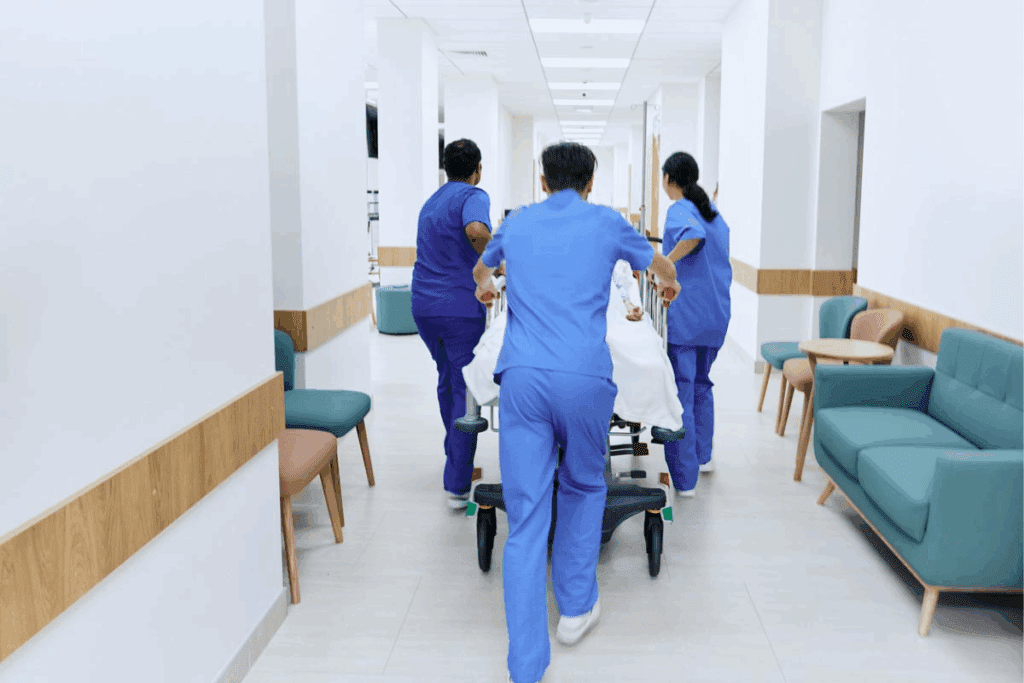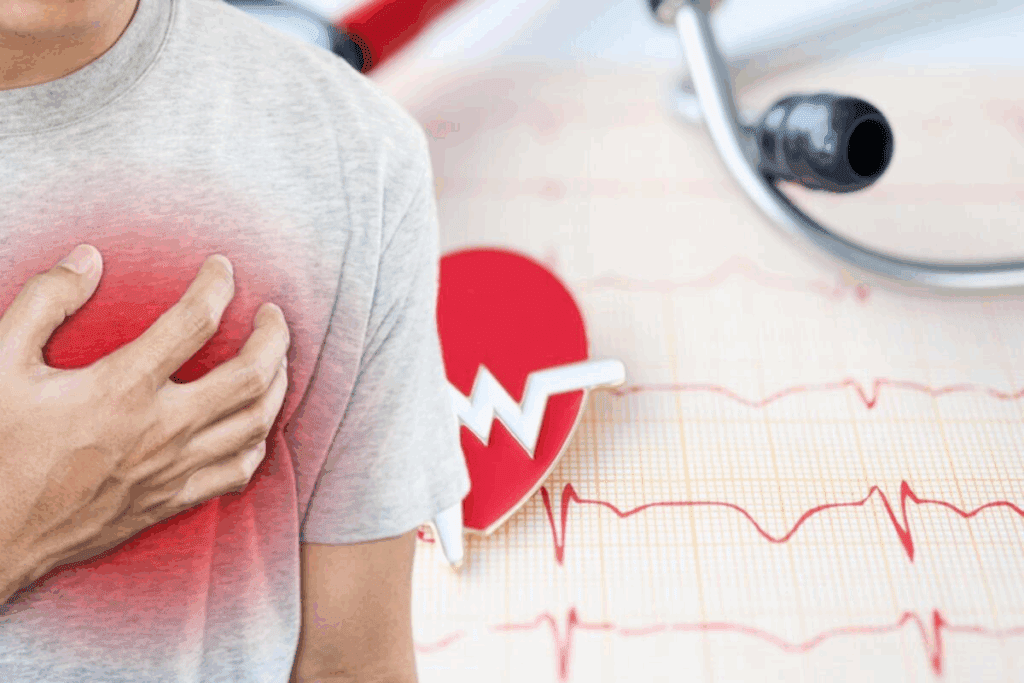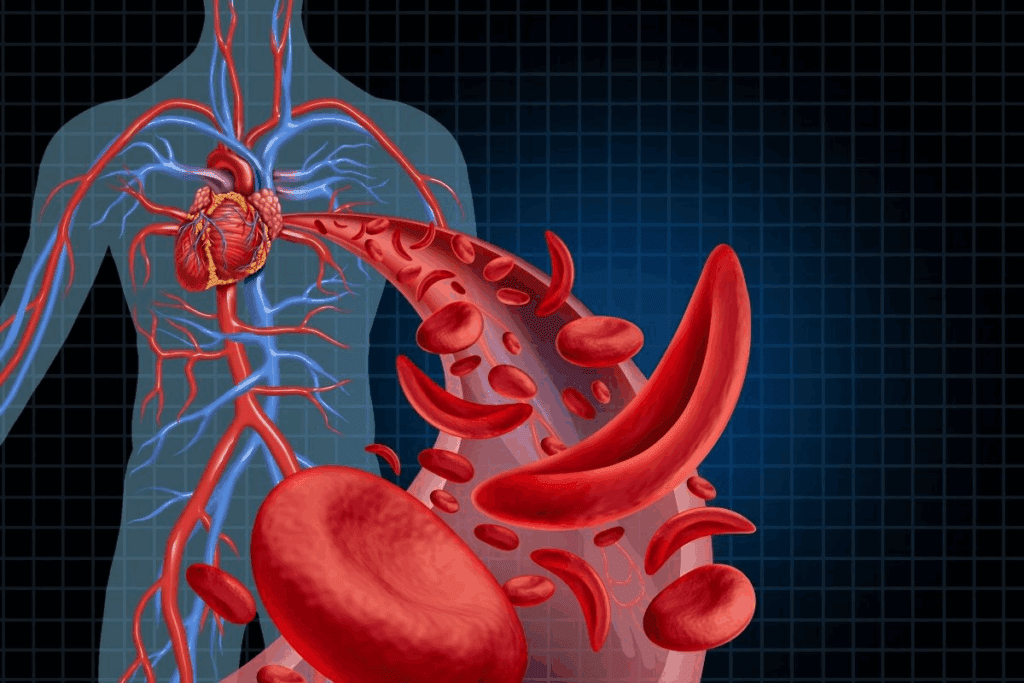
Are you feeling a sudden surge in blood pressure and wondering why? At Liv Hospital, we’re here to help. We offer top-notch care to understand why your blood pressure might spike.
Discover causes of sudden high blood pressure and what triggers BP spikes.
Sudden high blood pressure, or a blood pressure spike, can happen for many reasons. Stress, anxiety, or health issues are common causes. Medical News Today says stress, certain medications, or stimulants can lead to sudden blood pressure increases. This can cause symptoms like chest pain, severe headaches, and vision changes.
It’s important to know the causes of sudden high blood pressure to manage it well. In this article, we’ll look at the 12 main reasons for sudden blood pressure spikes. This will help you understand what’s happening to your body.

A blood pressure spike happens when your blood pressure suddenly goes up too high. This can lead to serious health problems. It’s important to know what happens during this to keep your heart healthy and know when to get medical help.
Normal blood pressure is when your systolic pressure is under 120 mm Hg and diastolic is under 80 mm Hg. The American Heart Association says a crisis is when your systolic is 180 mm Hg or higher, or diastolic is 120 mm Hg or higher. These high levels are dangerous and need quick medical help.
Many things can cause a sudden rise in blood pressure. This includes emotional outbursts, physical pain, or eating foods with tyramine. These spikes might not last long but can be risky, mainly for people with heart problems.
BP spikes can happen to anyone. But some things make it more likely. These include lifestyle choices, health conditions, and some medicines. Knowing these risks is key to preventing and managing them.
Research shows BP spikes are common, mainly in adults with high blood pressure or a lot of stress. Knowing the causes and taking steps to prevent them can lower the risks of sudden blood pressure increases.
The effects of BP spikes can be immediate and long-lasting. A big spike can cause heart attacks, strokes, or kidney damage right away. Over time, high blood pressure can lead to chronic cardiovascular disease and other long-term health problems.
It’s vital to manage your blood pressure and prevent spikes to avoid these risks. This means making lifestyle changes, checking your blood pressure often, and following your doctor’s advice.

Lifestyle choices greatly affect our blood pressure. What we eat and how we live can harm our heart health. We’ll look at how certain habits lead to sudden high blood pressure.
Caffeine is a stimulant that raises blood pressure. Drinking too much caffeine can cause sudden spikes, mainly in caffeine-sensitive people. Reducing caffeine intake or choosing decaf can help.
Other stimulants, like some medications and energy drinks, also raise blood pressure. Knowing what’s in our products and using them wisely is key.
Smoking and nicotine products raise blood pressure. Nicotine narrows blood vessels, increasing pressure. Quitting smoking is a major step towards lowering blood pressure and heart disease risk.
Nicotine replacement therapy and counseling can aid in quitting. Knowing the dangers of smoking and nicotine can inspire change.
What we eat affects our blood pressure. Foods with tyramine, like aged cheeses and wines, can raise blood pressure. Being aware of these foods helps manage blood pressure.
Too much sodium is linked to high blood pressure. Excess sodium causes fluid retention, straining blood vessels. Reducing sodium intake by using herbs and spices can help.
Stress and anxiety can make your blood pressure go up. Knowing how these feelings affect your body helps you control your blood pressure better.
Stress makes our body’s “fight or flight” response kick in. It releases hormones like adrenaline and cortisol. These hormones get our heart rate and blood pressure up, ready to face threats.
Acute stress response is okay for immediate dangers. But, long-term stress can keep your blood pressure high. Medical News Today says stress might raise blood pressure because of these hormones.
Anxiety and panic attacks also raise your blood pressure. During a panic attack, your body’s stress response is on full alert. This leads to a fast heartbeat, sweating, and a blood pressure spike.
Using relaxation methods like deep breathing and meditation can help. It’s key to know the signs of anxiety and panic to act quickly.
Anger and emotional outbursts can also affect your blood pressure. When we’re angry, our body’s stress response kicks in, raising our heart rate and blood pressure.
Learning to handle anger and emotional responses is helpful. Techniques like mindfulness and cognitive-behavioral therapy can control blood pressure spikes.
| Emotional Trigger | Effect on Blood Pressure | Management Technique |
| Stress | Increases BP through stress hormones | Relaxation, exercise |
| Anxiety/Panic Attacks | Raises BP during panic episodes | Deep breathing, meditation |
| Anger/Emotional Outbursts | Surge in BP during outbursts | Mindfulness, CBT |
Many common medications, both prescription and over-the-counter, can raise blood pressure. It’s key to know how different drugs affect your blood pressure. This helps manage and prevent sudden spikes.
Over-the-counter (OTC) medications are easy to get and often used without thinking. But, some can increase blood pressure. For example, decongestants in cold and allergy meds can narrow blood vessels, raising blood pressure. It’s important to read labels and know the ingredients in your meds.
NSAIDs like ibuprofen and naproxen can also raise blood pressure. They can make the body hold more fluid and affect kidney function. This is a big problem for people with high blood pressure.
Prescription medications can also raise blood pressure. Some antidepressants, like SSRIs, can affect blood pressure differently in everyone. Corticosteroids, used for inflammation, can cause fluid retention and increase blood pressure.
Some prescription drugs, like oral contraceptives and hormone replacement therapies, can also impact blood pressure. Talking to your healthcare provider about these effects is vital.
How different medications work together and with your body can greatly affect blood pressure. Taking several medications that raise blood pressure together can be dangerous. The time you take your meds can also affect your blood pressure.
To manage blood pressure spikes from medications, it’s important to:
Being aware of your medications’ effects and working with your healthcare provider can help. This way, you can lower the risk of blood pressure spikes from medications.
Many medical conditions can lead to sudden spikes in blood pressure. Issues like thyroid disorders, kidney disease, or tumors in the adrenal gland can cause this. It’s key to know about these conditions to manage and treat high blood pressure well.
Kidney disease is a common cause of high blood pressure. The kidneys help control blood pressure by managing fluids and hormones. When the kidneys don’t work right, blood pressure can go up.
Kidney disease can make blood pressure rise by holding onto sodium and water, increasing blood volume.
Studies show people with chronic kidney disease are more likely to get high blood pressure. Taking care of kidney disease through medical treatment and lifestyle changes can help control blood pressure.
Thyroid problems, like hyperthyroidism and hypothyroidism, can affect blood pressure. Hyperthyroidism, with an overactive thyroid, can increase heart rate and blood pressure. Hypothyroidism, or an underactive thyroid, can also change blood pressure, but in a less direct way.
Thyroid hormones are important for heart health. Imbalances can cause heart symptoms, including blood pressure changes. Treating thyroid issues can help stabilize blood pressure and lower heart risks.
Adrenal gland tumors, like pheochromocytoma, are rare but serious causes of sudden high blood pressure. Pheochromocytoma is a tumor that releases too many catecholamines, causing high blood pressure, heart racing, and other symptoms.
Pheochromocytoma can lead to severe hypertension that’s hard to treat with usual blood pressure medicines. Finding and treating adrenal gland tumors is vital for managing blood pressure and avoiding heart problems.
Our surroundings and immediate situations can greatly influence our blood pressure, sometimes leading to sudden increases. Understanding these factors is key to managing and maintaining healthy blood pressure levels.
“White Coat Syndrome” is a common issue where people’s blood pressure goes up in medical settings due to anxiety or stress. This shows how much our mental state can affect our physical health. A study found that the anxiety from being in a medical environment can make blood pressure go up.
“The mere presence of a healthcare professional can cause a stress response, leading to increased blood pressure.”
Physical pain can also greatly affect blood pressure. When we’re in pain, our body’s stress response kicks in, releasing hormones like adrenaline. This can make blood vessels constrict and blood pressure rise. So, managing pain well is important for keeping blood pressure stable.
Environmental stressors like extreme temperatures and high altitudes can also impact blood pressure. For example, cold weather can make blood vessels constrict, leading to higher blood pressure readings. High altitudes can also affect oxygen levels in the blood, which can influence blood pressure. Knowing about these factors can help us take steps to prevent blood pressure issues.
By recognizing and understanding these situational and environmental factors, we can better manage our blood pressure and reduce the risk of sudden spikes.
Hormones are key to keeping our blood pressure in check. They control heart rate and blood vessel constriction. This is vital for our heart health.
Cortisol, or the “stress hormone,” is made by the adrenal gland. It can make blood pressure go up when it’s too high. Long-term stress can keep cortisol levels high, leading to high blood pressure.
Stress affects our hormones and blood pressure. To fight this, try meditation, deep breathing, and exercise. These can help keep cortisol levels in check and improve heart health.
Thyroid hormone is important for metabolism, heart rate, and blood pressure. Too much or too little can cause blood pressure to swing. It’s key to understand how thyroid issues affect our heart.
The endocrine system has glands that make hormones for different body functions. Problems like adrenal gland issues or pheochromocytoma can affect blood pressure. It’s important to know the signs and get help when needed.
Knowing how hormonal imbalances affect blood pressure helps us manage heart health better. We should be aware of hormonal changes and take steps to control them.
It’s key to know the signs of a blood pressure spike. A sudden rise can cause serious health problems if not handled right.
Spotting the signs of a sudden blood pressure spike is important. Look out for severe headache, dizziness, chest pain, and shortness of breath. You might also see nosebleeds, fatigue, or confusion. If you or someone you know shows these signs, act fast.
Knowing when to get medical help is critical. If you have chest pain, severe headache, or trouble breathing, call for emergency care right away. For milder symptoms, talk to your doctor. Medical News Today says to seek immediate help for vision changes or severe dizziness.
| Symptom | Severity | Action |
| Chest Pain | Severe | Seek Emergency Care |
| Severe Headache | Severe | Seek Emergency Care |
| Mild Dizziness | Mild | Contact Your Doctor |
Tracking your blood pressure at home is helpful. Use a home monitor to keep an eye on your readings. A log of your readings can help your doctor understand your patterns and make better decisions for your care.
Preventing sudden high blood pressure starts with managing the causes and living a healthy lifestyle. Knowing the triggers and risk factors helps people take action. This can lower their risk.
Eating well, staying active, and managing stress are key. At Liv Hospital, we stress the need for full care and support. Combining lifestyle changes with medical treatment helps keep blood pressure in check.
Managing blood pressure long-term means keeping an eye on it and adjusting treatments as needed. Working with healthcare providers and using prevention strategies helps control blood pressure. This improves overall health and well-being.
Many things can cause sudden high blood pressure. This includes lifestyle choices and emotional triggers. Also, certain medications, medical conditions, and hormonal imbalances can play a role.
High blood pressure can happen suddenly. Stress, anxiety, and some medications are common causes. Medical conditions like kidney disease or thyroid disorders can also be factors.
Symptoms include headache, dizziness, and nausea. In severe cases, you might feel confused, have seizures, or even experience a heart attack or stroke.
To manage sudden high blood pressure, first understand its causes. Then, adopt a healthy lifestyle. Regularly check your blood pressure and follow your doctor’s advice on medication.
Yes, some foods can raise blood pressure quickly. Foods high in tyramine or sodium are examples.
Stress, anxiety, and anger can quickly raise blood pressure. This is because the body’s stress response releases hormones like cortisol and adrenaline.
Yes, some medications can increase blood pressure. This includes decongestants, antidepressants, and corticosteroids.
Certain conditions can cause sudden high blood pressure. These include kidney disease, thyroid disorders, and adrenal gland tumors like pheochromocytoma.
White coat syndrome, or anxiety in a medical setting, can temporarily raise blood pressure.
Seek emergency care for severe symptoms. This includes chest pain, severe headache, confusion, or trouble breathing. Also, if your blood pressure is extremely high.
Use a blood pressure monitor at home. Track your readings and look for patterns or spikes. This helps manage your blood pressure effectively.
A healthy lifestyle can prevent sudden high blood pressure. This includes a balanced diet, regular exercise, stress management, not smoking, and limiting alcohol and caffeine.
World Health Organization. (2025). 12 Causes of Sudden High Blood Pressure Quick. Retrieved from https://www.who.int/news-room/fact-sheets/detail/hypertension
Subscribe to our e-newsletter to stay informed about the latest innovations in the world of health and exclusive offers!
WhatsApp us